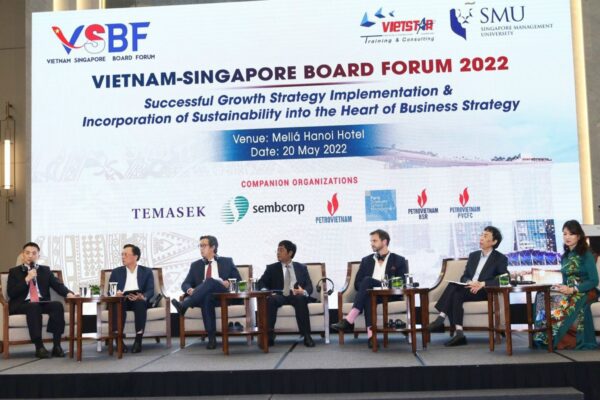The Vietnam – Singapore Board Forum, with the theme “Successful Growth Strategy Implementation & Incorporation of Sustainability into the Heart of Business Strategy”, was held recently in Hanoi and via teleconference in Singapore.

Leaders from the Ministry of Science and Technology, the Ministry of Industry and Trade, and leading enterprises in Vietnam and Singapore at VSBF 2022.
The Vietnam – Singapore Board Forum (VSBF 2022), with the theme “Successful Growth Strategy Implementation & Incorporation of Sustainability into the Heart of Business Strategy”, was recently held in Hanoi and via teleconference in Singapore. Leaders from numerous large enterprises at the Forum said the incorporation of sustainability into the heart of business strategy cannot be delayed and must be accelerated in the “new normal”.
Pandemic put pressure on enterprises to change
Addressing the Forum, Deputy Minister of Science and Technology Tran Van Tung said Covid-19 had an impact on all countries’ economic, social, and political life and on international relations. The development strategies and models of many countries are under pressure to change, after the pandemic revealed unsustainable patterns in existing production and consumption. Climate change remains one of the greatest challenges facing humanity in the 21st century.
The Deputy Minister emphasized that in this context, successful growth strategy implementation and incorporation of sustainability into the heart of business strategy has become a necessary requirement for both the public and private sectors.
Ms. Pham Thi Thu Hang, Director of the VSBF and CEO of the VietStar Training and Consulting JSC (VietStar), which consults leading Vietnamese enterprises on sustainable development strategies and digital transformation strategies, said it was time for enterprises to associate sustainability not only with trade-offs but also with competitive advantages and long-term business performance.
“Organizations and leaders that incorporate sustainability into the heart of their business strategy will benefit from more resilient supply chains, efficient business practices, enhanced stakeholder interaction, and improved governance to obtain better long-term financial performance and value creation,” she said.
How to incorporate sustainability into business strategy?
Discussing successful growth strategy implementation, Dr. Simon J.D. Schillebeeckx, Professor of Strategic Management at the Singapore Management University (SMU), said many enterprises currently focus on profits without considering the environmental impact. However, in the new context, every enterprise must identify the goal of sustainable green transition to a low carbon economy as a mandatory requirement. In order to do that, enterprises must balance three pillars: people, profits, and planet.
In fact, sustainable green transformation has been successfully implemented by large corporations in Singapore such as Temasek and Sembcorp, which have focused on putting sustainability at the heart of their business strategy.
“As we invest to deliver sustainable value over the long term, sustainability is at the core of everything we do,” Mr. Fock Wai Hoong, Managing Director of Temasek International – Singapore, told the Forum. “Our vision is creating the ‘ABC World’: Active economy, Beautiful society, and Clean earth.” Temasek started their sustainability efforts in 2008 and it has become the central focus of their long-term strategy. According to Mr. Fock, the pathway to a sustainable future is investing in climate-aligned opportunities, encouraging decarbonization efforts in businesses, and enabling carbon negative solutions. In particular, decarbonization is not a niche area and is growing exponentially.
Mr. Wong Kim Yin, Group President and CEO of Sembcorp Industries, said the company has changed its investment portfolio from traditional energy to clean energy, and will halve emissions by 2030 from 2010 levels and reach net-zero around 2050. In order to gain sustainability, enterprises need strategic transformation. First, it is necessary to have a commitment from the highest levels that is in tune with global sustainability trends, and to secure the confidence of communities around the world. Specifically, in Vietnam, State-owned corporations will lead the way. Successful transformation requires best-in-class capabilities, with energy enterprises needing to be equipped with capabilities in terms of renewables, energy storage, and hydrogen. He added that Vietnam’s energy transition must balance security, reliability, and access and affordability.
 Leaders from Singaporean and Vietnamese corporations discuss integrating sustainability into the core of business
Leaders from Singaporean and Vietnamese corporations discuss integrating sustainability into the core of business
Vietnamese enterprises staying abreast of latest trends
At the United Nations Climate Change Conference of the Parties (COP26) in Glasgow last November, the Prime Minister announced that Vietnam will target achieving net-zero carbon emissions by 2050. In order to reach goals in sustainable economic growth, the government has stepped up its determination to carry out structural transformation in the energy industry towards greener, cleaner, and more efficient energy use.
Addressing the Forum, Dr. Vo Tri Thanh, Chairman of the Vietnam National Committee for the Pacific, spoke of the green economy in relation to enterprises. The world is witnessing mega-trends in geo-politics, globalization and liberalization, technology, and climate change, with different scenarios. Current economic development has witnessed qualitative changes: from economic growth to sustainable and inclusive development, from “brown economy” to “green economy”, from “linear economy” to “circular economy”, and from “real economy” to “digital economy”. Dr. Thanh also spoke about three driving forces in Vision 2040 for enterprises: trade and investment; innovation and digital transformation; and strong, balanced, sustainable, and inclusive growth.
To jointly achieve this goal, Mr. Hoang Quoc Vuong, Chairman of the Vietnam Oil and Gas Group (PetroVietnam), said it has introduced development strategies prioritizing sustainable clean energy sources such as natural gas / LNG and offshore wind power. It will mainly focus on risk forecasting, risk management, portfolio management, and strategic management, restructuring to low-carbon models and promoting the application of digital transformation and innovation.
PetroVietnam has the responsibility of joining hands with the government to both ensure energy security and reduce greenhouse gas emissions to protect the environment, respond to climate change, and contribute to the successful implementation of the sustainable development strategy.
Link: https://vneconomy.vn/vsbf-2022-helps-enterprises-incorporate-sustainability-into-business-strategies.htm

 Leaders from Singaporean and Vietnamese corporations discuss integrating sustainability into the core of business
Leaders from Singaporean and Vietnamese corporations discuss integrating sustainability into the core of business

